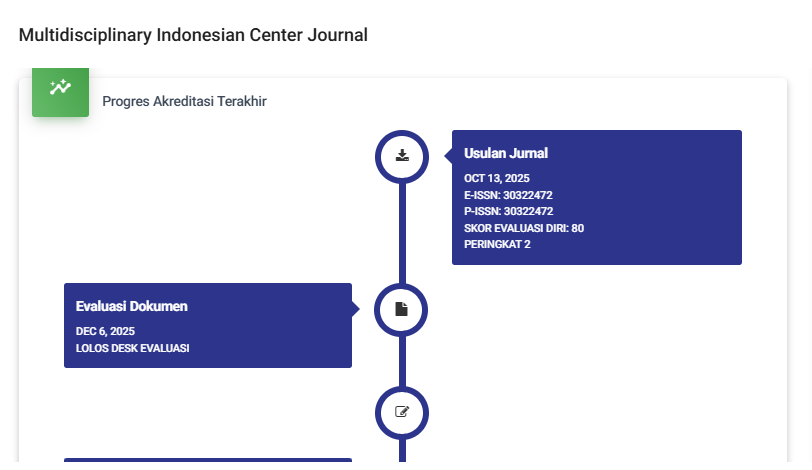ANALYSIS OF COMPETING INTERESTS IN THE KARTU PETANI BERJAYA POLICY FOR SUSTAINABLE COMMUNITY AGRICULTURAL DEVELOPMENT IN LAMPUNG PROVINCE
DOI:
https://doi.org/10.62567/micjo.v2i3.841Keywords:
Kartu Petani Berjaya, competing interests, public policy, sustainable agriculture, Lampung ProvinceAbstract
This study analyzes the competing interests within the Kartu Petani Berjaya (KPB) policy as part of efforts to promote sustainable community-based agricultural development in Lampung Province. The KPB program was launched with the goal of improving farmers' welfare through digitally integrated agricultural services. However, initial observations indicate resistance from some farmers and signs of political interest dominance in both the formulation and implementation processes. The study aims to identify the political motives behind the policy, the sustainability of the program, farmers' literacy regarding the E-KPB system, and the extent to which the program empowers farmers and engages stakeholders. Using a descriptive qualitative approach with thematic analysis and source triangulation techniques, data were collected through in-depth interviews with academics and government officials, as well as document studies. The findings reveal that the dominance of regional leaders in decision-making has led to a program orientation that is more symbolic and electoral in nature. The dynamics of competing interests emerge both vertically and horizontally, resulting in weak coordination and reduced policy effectiveness. The transition from KPB to E-KPB has also shifted the program’s focus and reduced its tangible benefits for farmers. The study recommends strengthening multi-stakeholder collaborative governance in agricultural policy, reevaluating the structure of the E-KPB system, and actively involving academics and farmer associations. These findings contribute theoretically to the study of public policy and policy framing, and practically to improving the implementation of programs based on the real needs of farming communities.
Downloads
References
Agustino, L. (2008). Dasar-dasar kebijakan publik. Alfabeta Publisher.
Biro Perekonomian Sekretariat Daerah Provinsi Lampung. (2022). Laporan pelaksanaan program Kartu Petani Berjaya (KPB) Tahun 2022.
Chan, A.-W., Tetzlaff, J. M., Gotzsche, P. C., Altman, D. G., Mann, H., Berlin, J. A., Dickersin, K., Hrobjartsson, A., Schulz, K. F., Parulekar, W. R., Krleza-Jeric, K., Laupacis, A., & Moher, D. (2013). SPIRIT 2013 explanation and elaboration: guidance for protocols of clinical trials. BMJ, 346(jan08 15), e7586–e7586. https://doi.org/10.1136/bmj.e7586
Cheema, G. S. (2005). Building democratic institutions: Governance reform in developing countries. Kumarian Press Inc.
Ibnu, M. (2024). Tantangan Sektor Pertanian dalam Memenuhi Kebutuhan Pangan Berkelanjutan. Jurnal Litbang: Media Informasi Penelitian, Pengembangan Dan IPTEK, 20(2), 135–148. https://doi.org/10.33658/jl.v20i2.400
Ibnu, M., Offermans, A., & Glasbergen, P. (2018). Certification and farmer organisation: Indonesian smallholder perceptions of benefits. Bulletin of Indonesian Economic Studies, 54(3), 387–415. https://doi.org/10.1080/00074918.2018.1506093
Listiana, I, Efendi, I., Mutolib, A., & Rahmat, A. (2019). The behavior of Extension Agents in Utilizing Information and Technology to Improve the Performance of Extension Agents in Lampung Province. IOP Conf. Series: Journal of Physics: Conf. Series, 1155(1). https://doi.org/10.1088/1742-6596/1155/1/012004
Listiana, Indah, Sumardjo, Sadono, D., & Tjitropranoto, P. (2018). Pengaruh Pemanfaatan Teknologi Informasi terhadap Kapasitas Penyuluh di Provinsi Lampung. IPB University.
Magesa, M. M., Michael, K., & Ko, J. (2020). Access and use of agricultural market information by smallholder farmers: Measuring informational capabilities. The Electronic Journal of Information Systems in Developing Countries, 86(6). https://doi.org/10.1002/isd2.12134
Miles, M. B., Huberman, A. M., & Saldana, J. (2014). Qualitative Data analysis A methodes Sourcebook (Third). SAGE Publications Ltd.
Moleong, L. J. (2018). Metodologi Penelitian Kualitatif. PT Remaja Rosdakarya.
Ningrum, V. (2019). Agriculture Liberalization and Marginalized Young Local People: Evidence from a Food Plantation in Lampung. Jurnal Ilmu Sosial Dan Ilmu Politik, 22(3), 230–244. https://doi.org/10.22146/JSP.37654
Pawlak, K., & Kołodziejczak, M. (2020). The Role of Agriculture in Ensuring Food Security in Developing Countries: Considerations in the Context of the Problem of Sustainable Food Production. Sustainability, 12(13), 5488. https://doi.org/10.3390/su12135488
Putraditama, A., Kim, Y.-S., & Baral, H. (2021). Where to put community-based forestry?: Reconciling conservation and livelihood in Lampung, Indonesia. Trees, Forests and People, 4, 100062. https://doi.org/10.1016/j.tfp.2021.100062
S, L. S., Rangga, K. K., Indriyani, Y., Sayekti, W. D., Syarief, Y. A., & Hasanuddin, T. (2023). Strategies to Increase Independent Prosperous Graduation Family Hope Program Recipients in Central Lampung Regency. Journal of Social Research, 2(7), 2443–2455. https://doi.org/10.55324/josr.v2i7.1206
Setiawan, B. A., & Sucihatiningsih, D. W. P. (2016). Strategies To Develop Food Crop Commodity To Improve the Prosperity of Rural Farmers in Gr0Bogan District. Journal of Indonesian Applied Economics, 6(2), 176–190. https://doi.org/10.21776/ub.jiae.2016.006.02.3
Sugiyono. (2013). Metode penelitian pendidikan pendekatan kuantitatif, kualitatif dan R&D. Bandung: Alfabeta.
Wildayana, E., Hasan, M. Y., Armanto, M. E., Zahri, I., Adriani, D., Sari, R. F., Nursittah, N., Lestari, F., & Oktavia, R. (2018). The Highest Retail Price (HET) of Subsidized Fertilizer at the Farmer’s Level in South Sumatra Rice Farming, Indonesia. Jurnal Ekonomi Pembangunan: Kajian Masalah Ekonomi Dan Pembangunan, 19(1), 24. https://doi.org/10.23917/jep.v19i1.5137
Yanfika, H., Nurmayasari, I., K. Rangga, K., & Silviana, F. (2022). Dukungan Lembaga dan Tingkat Partisipasi Petani dalam Keberlanjutan Usahatani Padi Sehat di Desa Rejo Asri. Jurnal Penyuluhan, 19(01), 23–34. https://doi.org/10.25015/19202343094
Downloads
Published
How to Cite
Issue
Section
License
Copyright (c) 2025 Riky Fernando, Muhammad Ibnu, Helvi Yanfika, Kordiyana K. Rangga, Indah Listiana

This work is licensed under a Creative Commons Attribution-ShareAlike 4.0 International License.



























